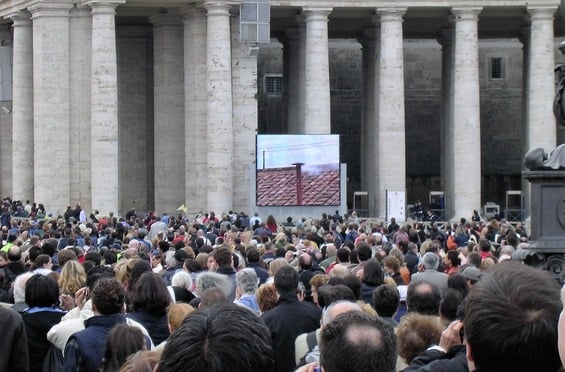Search
Prayer, not speculating, is helpful
-
 April 25, 2025When a pope passes away or, in rare cases, resigns, the Church enters a vacancy phase, or in Latin, “Sede Vacante.” Since the Church has centuries of experience dealing with these situations, there are established rules and protocols for every step, from the funeral to the Conclave, detailed in three books.
April 25, 2025When a pope passes away or, in rare cases, resigns, the Church enters a vacancy phase, or in Latin, “Sede Vacante.” Since the Church has centuries of experience dealing with these situations, there are established rules and protocols for every step, from the funeral to the Conclave, detailed in three books.
The first book describes the funeral liturgy of a pope. Pope Francis changed it and published a new version, omitting some requirements and allowing for a simpler ceremony. He will be buried in St. Mary Major, not in St. Peter, which is not a requirement for popes.
When a pope passes away, all heads of the Dicasteries of the Roman Curia cease, as do members of the Dicasteries and the Secretary of State. Consequently, no changes or decisions can be made during this vacancy period. There are a few exceptions: the Camerlengo, the Vicar General for the Diocese of Rome, the Vicar General for Vatican City, the Major Penitentiary, the Archpriest of the Basilica, and Papal Representatives continue their duties.
Once the nine-day mourning period concludes, the Conclave begins. All cardinals under the age of 80 (on the day the pope passes away) are eligible to participate in the election, totaling 135 in that category. Cardinals over 80 are called to lead the people in prayer, either at home or in a Basilica in Rome. Generally, there is great excitement and speculation surrounding a conclave, influenced by Hollywood movies and popular literature, as participating cardinals must remain silent about any details. However, the Sixtine Chapel, where the Conclave will take place, is not Capitol Hill; it is, first and foremost, a prayerful event, an expression of the Holy Spirit in action.
Who can become the next pope? While it is customary for him to be elected from the college of cardinals, this is not an obligation: technically, any baptized Catholic man can be elected. Of the 135 cardinals under 80, 108 were appointed by Pope Francis. After the death of John Paul II, only three cardinals were still appointed by his predecessor, Pope Paul VI. When Benedict XVI resigned, the majority were still appointed by St. John Paul II, with only 43 appointed by Benedict.
The cardinals determine when the conclave should begin to elect a new pope. However, Pope Benedict stated that it should start at least 15 days after the pope's death or resignation and can be no more than 20 days after the papacy’s vacancy. In past centuries, this would have been impossible due to the different means of transportation. An earlier start is possible, but only if all cardinal electors are present.
The funeral marks the beginning of a mandated nine-day period of official mourning, known as the “novendiales.” For the eight days following the burial, additional memorial Masses are celebrated in St. Peter’s Basilica.
The Vatican official whose job begins when a pope dies or resigns is U.S. Cardinal Kevin J. Farrell. His duties, in brief, include verifying the Pope’s death, preparing for the conclave, safeguarding and managing the Holy See’s assets, and overseeing the Pope's burial. Before the conclave, all the cardinals—including those over 80—participate in congregations, which are meetings to discuss the Church's challenges and the upcoming papal election. These meetings also serve as a platform for cardinals to get to know each other and identify potential candidates.
The constitutional document of the conclave states that the cardinals draw lots to determine the three cardinals who will assist the camerlengo by serving three-day terms as members of the “particular congregation.” However, Pope Francis’ apostolic constitution on the Roman Curia, “Praedicate Evangelium,” says that “one of these is the Cardinal Coordinator of the Council for the Economy,” currently German Cardinal Reinhard Marx of Munich and Freising.
People in the media and in private conversations are already speculating about who will be the next pope, and this will increase once the conclave begins. Bishop Mulvey clarified: “I asked one thing—let us await the Pope that the Holy Spirit will choose for the Church and the world; don’t speculate if the new pope will be conservative or liberal.” Right now, the best thing each Catholic can do is pray for the conclave so that each cardinal may follow the Holy Spirit.
